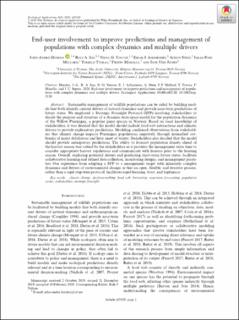End-user involvement to improve predictions and management of populations with complex dynamics and multiple drivers
Henden, John-André; Ims, Rolf Anker; Yoccoz, Nigel; Asbjørnsen, Einar Johannes; Stien, Audun; Mellard, Jarad Pope; Tveraa, Torkild; Marolla, Filippo; Jepsen, Jane Uhd
Peer reviewed, Journal article
Published version

View/
Date
2020Metadata
Show full item recordCollections
- Publikasjoner fra CRIStin - NINA [2364]
- Scientific publications [1392]
Original version
10.1002/eap. 2120Abstract
Sustainable management of wildlife populations can be aided by building models that both identify current drivers of natural dynamics and provide near-term predictions of future states. We employed a Strategic Foresight Protocol (SFP) involving stakeholders to decide the purpose and structure of a dynamic state-space model for the population dynamics of the Willow Ptarmigan, a popular game species in Norway. Based on local knowledge of stakeholders, it was decided that the model should include food web interactions and climatic drivers to provide explanatory predictions. Modeling confirmed observations from stakeholders that climate change impacts Ptarmigan populations negatively through intensified outbreaks of insect defoliators and later onset of winter. Stakeholders also decided that the model should provide anticipatory predictions. The ability to forecast population density ahead of the harvest season was valued by the stakeholders as it provides the management extra time to consider appropriate harvest regulations and communicate with hunters prior to the hunting season. Overall, exploring potential drivers and predicting short-term future states, facilitate collaborative learning and refined data collection, monitoring designs, and management priorities. Our experience from adapting a SFP to a management target with inherently complex dynamics and drivers of environmental change, is that an open, flexible, and iterative process, rather than a rigid step-wise protocol, facilitates rapid learning, trust, and legitimacy. climate change; decision-making; food web; harvesting; near-term forecasting; population cycles; stakeholders; strategic foresight.
